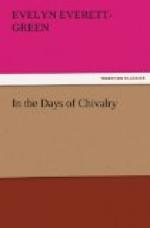“In truth I have long held that myself,” answered John, to whom some such remark had been made; and upon the pale face of the student there shone a light which Raymond had seen there before, and marked with a dim sense of awe. “We hear men talk of the days of chivalry, and mourn because they seem to be passing away. Yet methinks there may be a holier and a higher form of chivalry than the world has yet seen that may rise upon the ashes of what has gone before, and lead men to higher and better things. Raymond, I would that I might live to see such a day — a day when battle and bloodshed should be no longer men’s favourite pastime, but when they should come to feel as our Blessed Lord has bidden us feel, brothers in love, for that we love Him, and that we walk forward hand in hand towards the light, warring no more with our brethren of the faith, but only with such things as are contrary to His Word, and are hindering His purpose concerning the earth.”
Raymond listened with but small comprehension to a thought so vastly in advance of the spirit of the day; but despite his lack of true understanding, he felt a quick thrill of sympathy as he looked into John’s luminous eyes, and he spoke with reverence in his tone even though his words seemed to dissent from those of his companion.
“Nay, but how would the world go on without wars and gallant feats of arms? And sure in a good cause men must fight with all their might and main? Truly I would gladly seek for paynim and pagan foes if they might be found; but men go not to the Holy Land as once they did. There be foes nigher at home against whom we have to turn our arms. Good John, thou surely dost not call it a wicked thing to fight beneath the banner of our noble King when he goes forth upon his wars?”
John smiled one of those thoughtful, flickering smiles that puzzled his companion and aroused his speculative curiosity.
“Nay, Raymond,” he answered, speaking slowly, as though it were no easy matter to put his thought in such words as would be comprehensible to his companion, “it is not that I would condemn any man or any cause. We are placed in the midst of warlike and stirring times, and it may be that some great purpose is being worked out by all these wars and tumults in which we bear our share. It is only as I lie here and think (I have, as thou knowest, been here many times before amongst these books and parchments, able for little but study and thought) that there comes over me a strange sense of the hollowness of these earthly strivings and search after fame and glory, a solemn conviction — I scarce know how to frame it in words — that there must be other work to be done in the world, stronger and more heroic deeds than men will ever do with swords and spears. Methinks the holy saints and martyrs who went before us knew something of that work; and though it be not given to us to dare and suffer as they did, yet there come to me moments when




